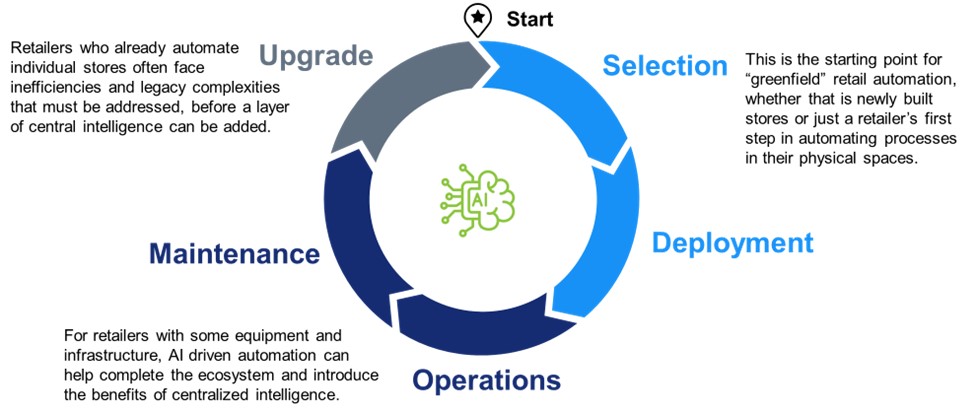
The dynamic nature of the retail industry necessitates continuous improvement and innovation. This is where the concept of enterprise automation comes in — a transformative force ignited by cutting-edge technology, enabling retail businesses to embrace efficiency, agility, and customer-centricity in a new way of managing store operations.
Enterprise automation facilitates the harmonious integration of Artificial Intelligence (AI) and Internet of Things (IoT), allowing retailers to manage their store operations better, offering better occupant experiences and making them more energy efficient.
“Enterprise automation has evolved from an option to a necessity in today’s landscape. Sustainability has taken center stage, compelling retailers to embrace eco-conscious principles. The enhanced energy efficiency and resource optimization empowers businesses to align with their sustainability goals and address customer demands effectively,” says Ravi Meghani, managing director of Carrier Abound, an AI and IoT business of Carrier, that technology company is pushing the limits of applying AI and automation for store operations.
Meghani believes that the essence of enterprise automation lies in harnessing available resources to their utmost potential, fostering energy efficiency and sustainability across the retail landscape.
Energy savings, reducing maintenance costs and improving the customer experience may seem like conflicting objectives. However, combining building automation with AI can help enterprise drive asset operations with business objectives. So, if a business wishes to prioritize occupant comfort, but manage costs, it can be achieved with Enterprise Automation without spawning complex projects. For example, take a retail store with 4 cooling equipment. If one unit starts to develop efficiency problems or is unable to maintain temperature specifications, the retailer would need to dispatch technicians to fix the same. It solves the problem at hand, but maintenance budgets are limited. If you don't sort it out earlier, it will consume a lot more energy. Enterprise Automation spots such failures and alerts in advance so that retailers can act earlier and prevent the failure of the piece of equipment. An even better way to solve the problem, is to intelligently defer the dispatch for later and suppress the operations of the problematic unit and make the other adjacent unit(s) work slightly harder and support operations. The decision of which unit(s) will be turned off and which unit(s) will support is made by AI. Retailers can defer maintenance here - achieve the goal of energy efficiency, and then later carry out the maintenance activity along with other equipment. All this can be achieved without compromising the customer experience aspect.
For retailers looking to launch Enterprise Automation, the concept of a 'virtuous cycle' comes into play and facilitates the pursuit of continuous improvement. This involves integrating with IoT edge devices, programming them with logics to achieve target goals, and strategically automating tasks with AI, to achieve those goals, such as improved occupant comfort and energy consumption optimization.

The virtuous cycle encompasses three pivotal phases - selection and deployment, operations and maintenance and upgrade – that are typically where buildings of today are categorized under.
Three recent projects undertaken by the Carrier Abound team are examples of the 3 phases:
- Selection and deployment phase: A prominent U.S. footwear brand, embarked on a journey to revamp its 550+ stores and establish 40 to 70 new sites annually for five years. The challenge was to achieve energy efficiency and occupant comfort without pushing costs. Carrier Abound presented a solution leveraging an embedded IoT device, BACnet-enabled comfort controllers, and wireless space sensors for seamless deployment. The process supervisor on the firm's data server enabled centralized control via the Abound Insights platform, augmented by the BluEdge Command Centers – remote 24/7 operations centers. Following a successful pilot in 10 stores, the solution was scaled to over 170 locations within two years, surpassing payback targets and ensuring continuous energy efficiency enhancements.
- Operations and maintenance phase: A well-known department store retailer in the U.S., celebrated for its in-person shopping experience and brand-name fashion discounts, aimed to drive predictive maintenance across its store network of over 2,000 stores. Carrier Abound standardized the heating, ventilation, and air conditioning (HVAC) system and lighting configurations across varied equipment brands. It streamlined processes, reducing response time by over 60 percent through lowered technician skill requirements. The solution deployed automated many manual tasks, enhanced agility in issue resolution, and optimized actions for energy efficiency and comfort. The centralized visibility provided by the Abound Insights platform and support from BluEdge Command Centers further empowered the client to minimize energy leaks, improve comfort, and elevate overall operational quality across their entire store portfolio.
- Upgrade phase: A leading U.S. fabric and craft supplies retailer, boasting 850+ physical stores as community hubs, sought to modernize its aged building systems and future proof its building automation strategy. With numerous legacy controls issues across its portfolio, low energy inefficiency and high equipment downtime, the retailer turned to Carrier Abound for solutions. The retrofitting journey commenced with an upgrade of legacy systems using advanced embedded IoT controllers and an on-site data center. Leveraging its store automation software, the client enacted automated actions, optimizing energy usage. The platform's comprehensive view enhanced system health monitoring. The BluEdge Command Centers' support bolstered energy savings, uptime, and policy adherence. Remarkably, the client spent less on system upgrades than anticipated repair costs, signifying cost-effectiveness. The integration of the Abound Insights platform offered a centralized view and remote access, drastically reducing issues and downtime while facilitating seamless equipment upgrades. This successful upgrade transformed the retailer's operations, enhancing overall efficiency and future scalability.
Enterprise automation empowers retailers to make informed decisions at key milestones such as replace versus repair and also when to upgrade systems. With this data available on the fingertips, on can plan maintenance spend and capital utilization throughout the year.
By providing the tools to establish robust systems, gain insights, and harness AI's power, Carrier Abound empowers retailers to meet their enterprise level goals. This approach enhances efficiency and customer experiences and drives sustainable growth, culminating in substantial energy savings, elevated customer satisfaction, and a greener future.